
The world is now facing an energy crisis, and paying high attention to the solution of optimizing the energy efficiency. As a consequence, the development of WBG (Wide-Band-Gate), known as compound semiconductor, becomes one of major subject, including enhancing the generation efficiency from solar and wind power, speeding up charging time of EV (electric vehicle), and making high power efficiency in high performance computing. Meanwhile, to effectively secure the quality of products, high-level reliability validation and tests are necessary.
Application and trends of new generation power semiconductors in EV
The market growth of next-generation power semiconductor includes Silicon Carbide (SiC) and Gallium Nitride(GaN)is expected to reach nearly 20% annually. For SiC, there’re several advantages including low resistance, high-speed operation and high-temperature operation, etc. Therefore, the power components made of this material also contain great benefit of operating temperature, voltage, frequency, power range and energy consumption.
Select appropriate and cost-effective international standards for each product
Along with the flourish development of EV industry, automotive standards revise and update faster than before. Thus, when product or device comes to design verification stage, the methods of reliability validation should be followed up base on choosing the appropriate international standard for each product. For automotive discrete components, the most common standards are AEC-Q101 and AQG 324.
- AEC-Q101
AEC-Q101 is defined by Automotive Electronics Council (AEC) for stress test standards and test methods for discrete semiconductor components. According to this standard, the quality of automotive components when operating in various environments could be ensured via reliability tests. However, to establish high confidence index, along with the requirement for multiple lots and test objects, the cost is often high.
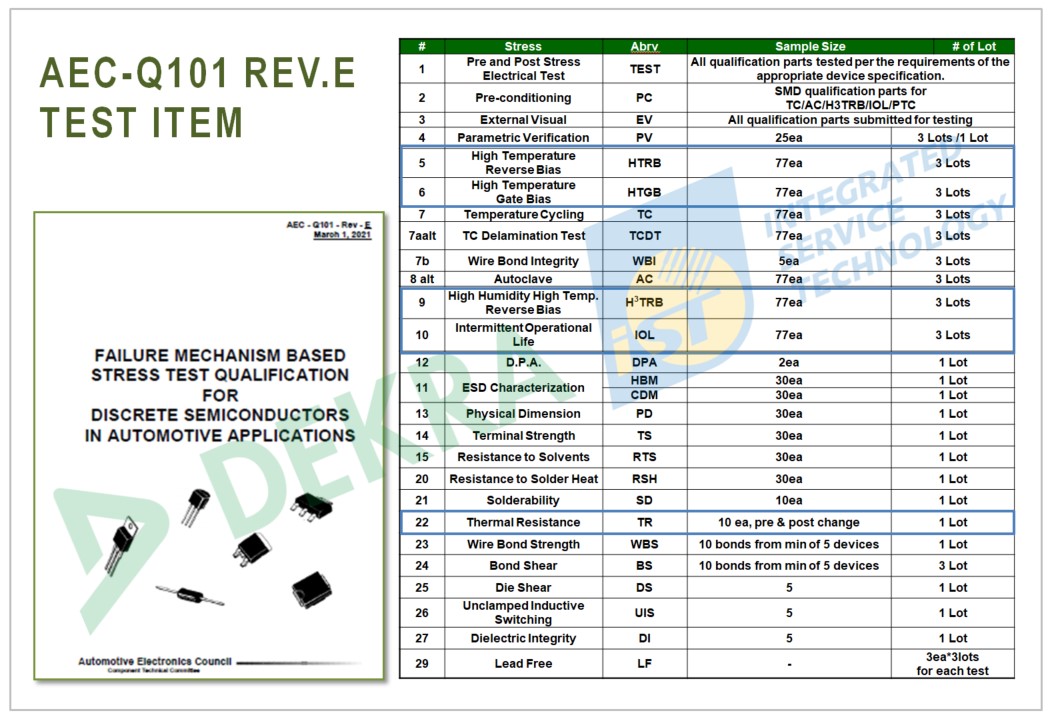

Figure 1: AEC-Q101 Rev.E test item
Reference: DEKRA iST
Reference: DEKRA iST
- AQG 324
AQG 324 is developed by German automotive OEMs, European Center for Power Electronics (EPEA) work group and ZVEI for the qualification of power electronic converter unit (PCU), power modules in vehicles. Compared with AEC-Q101, the requirement for the number of test objects is less, that’s the reason why it would cost less.
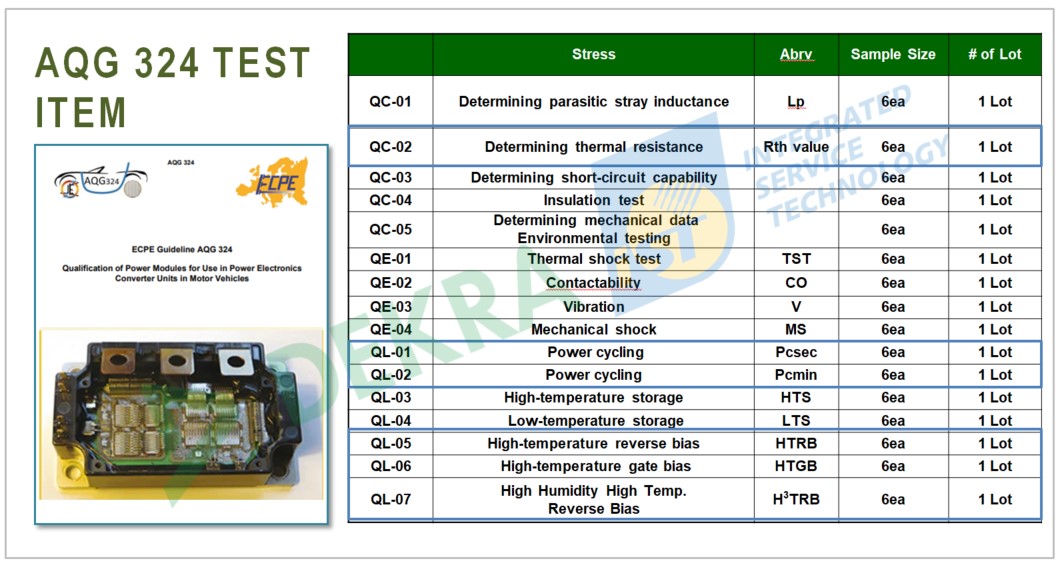

Figure 2: AQG 324 test item
Reference: DEKRA iST
Reference: DEKRA iST
Three key validation items from product reliability consideration
As a professional and experience third-party lab for reliability validation, DEKRA iST shared the three key reliability tests for automotive high power components, which are RTH, IOL and SOA.
- The feature and application of RTH (Thermal resistance) test
Thermal resistance (RTH) is a key parameter for heat transfer calculation and product development, which refers to the connection of both temperature difference and the amount of heat transfer between two points per unit time. Along with the rapid development of WBG components, to effectively control T-junction and accomplish reliability tests, it is necessary to get a clear picture of the RTH performance under different experimental conditions.
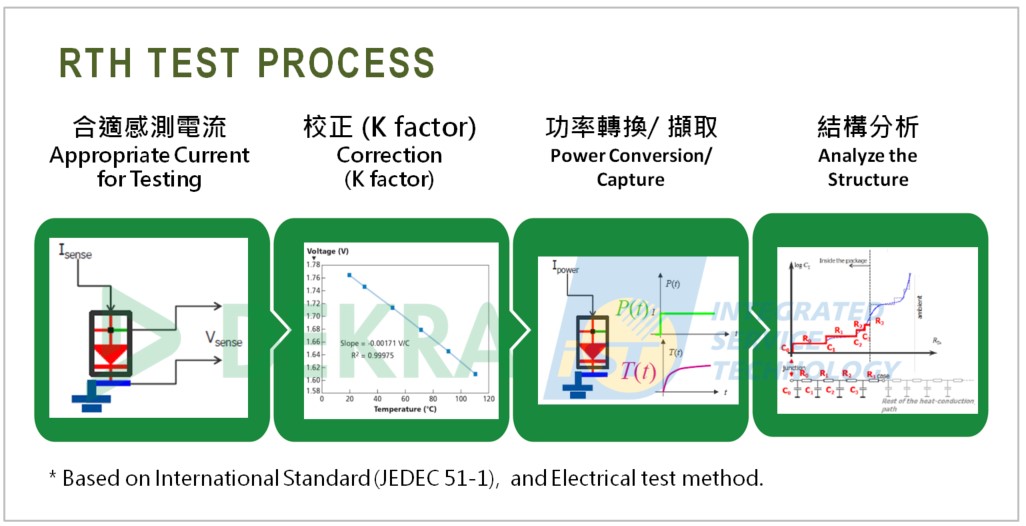

Figure 3: RTH(Thermal resistance)Test Process
Reference: DEKRA iST
Reference: DEKRA iST
- The feature and application of IOL (Intermittent Operating Life) test
Intermittent Operating Life (IOL) is a dynamic reliability test that simulates switching times via thermal cycles to estimate the operating life of the high power components. According to AQG 324 standards, IOL(known as Power cycling)needs to be tested to fail. Therefore, it would cause aging and quality variation of the test objects, especially the variety of thermal resistance and junction temperature (T-junction).
Taking IGBT structural layer as an example, we could find the most significant thermal stress damage on the contact surface during each layer of power component, which the places with severe temperature change. Peeling is the most common problem in the bonding layer, which used to be detected through destructive analysis such as micro-section. However, through IOL test system, the relevant data, including Rth, Tj, Vds, Ids and Igss, could be monitored simultaneously while the temperature of test objects changing. When the value of test objects begins to change abnormally, the fragile area of the structural layer could be analyzed in advance, so as to avoid the dilemma that the product would be unable to be analyzed after being burned. Additionally, after switching Ids on-off, the connecting wire would be aged and probably detached. Therefore, it is able to predict the life cycle of products via IOL test and to analyze the frequency of switching on-off to fail.
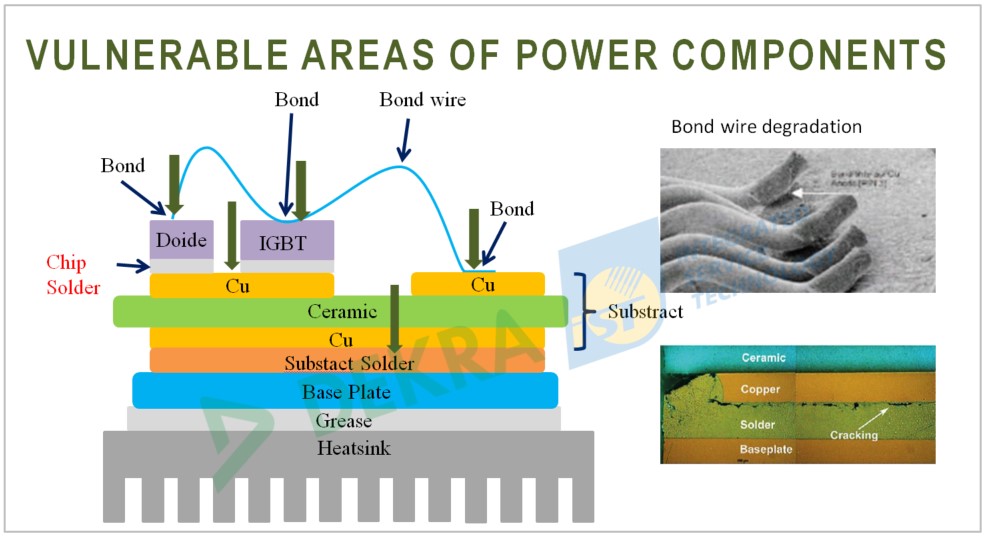
Taking IGBT structural layer as an example, we could find the most significant thermal stress damage on the contact surface during each layer of power component, which the places with severe temperature change. Peeling is the most common problem in the bonding layer, which used to be detected through destructive analysis such as micro-section. However, through IOL test system, the relevant data, including Rth, Tj, Vds, Ids and Igss, could be monitored simultaneously while the temperature of test objects changing. When the value of test objects begins to change abnormally, the fragile area of the structural layer could be analyzed in advance, so as to avoid the dilemma that the product would be unable to be analyzed after being burned. Additionally, after switching Ids on-off, the connecting wire would be aged and probably detached. Therefore, it is able to predict the life cycle of products via IOL test and to analyze the frequency of switching on-off to fail.

Figure 4: Vulnerable Areas of Power Components
Reference: DEKRA iST
Reference: DEKRA iST
- The feature and application of SOA (Safe Operating Area) test
Safe Operating Area (SOA) refers to the range of conditions such as voltage and current that power semiconductor components (like bipolar transistors, field effect transistors, thyristors, and Insulated Gate Bipolar Transistors) are able to work normally without causing damage. Normally, SOA could be obtained by actual measurement and calculation, but operating destructive measurement not only takes a lot of time, but also may lose a lot of products during the measurement, which makes the cost even higher.
DEKRA iST figures out SOA via calculating and analyzing electrical parameters and thermal resistance values. In this way, we could shorten test time and reduce the cost of test objects. By shortening the TTM (Time to market) of products, we help our clients to enhance competitive advantage of products in market.
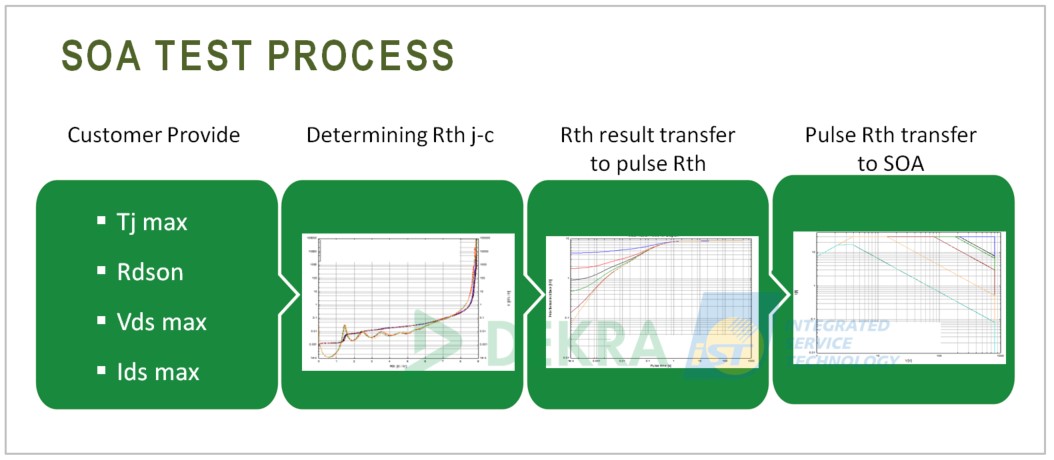
DEKRA iST figures out SOA via calculating and analyzing electrical parameters and thermal resistance values. In this way, we could shorten test time and reduce the cost of test objects. By shortening the TTM (Time to market) of products, we help our clients to enhance competitive advantage of products in market.

Figure 5: SOA(Safe Operating Area)Test Process
Reference: DEKRA iST
Reference: DEKRA iST
In addition, DEKRA iST also provides a complete one-stop validation service, including special high-voltage board design, power component parameter measurement, HTRB, HTGB, H3TRB, and TST and other vehicle-related reliability tests.
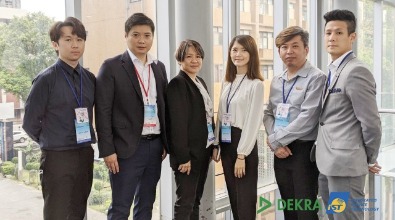
To make all your PROBLEMS SOLVED, we provide professional consultant and service.
For more information or service, please feel free to email to 📧 sos@dekra-ist.com




